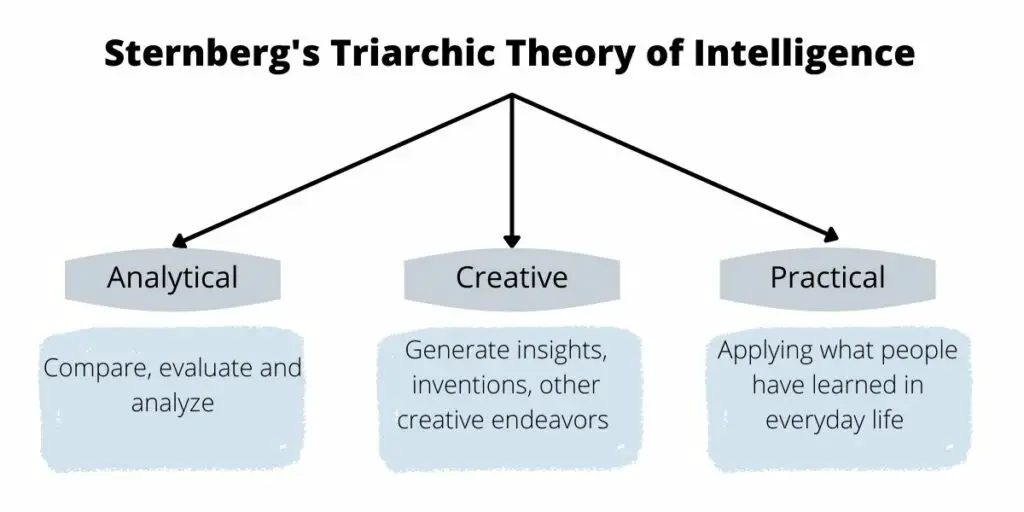Disclaimer: We sometimes use affiliate links in our content. For more information, visit our Disclaimer Page.
What exactly is analytical intelligence, and why do some people seem to be born with it while others don’t have any? Simply put, it is the ability to think critically and solve complex problems. It requires the use of reason, logic, and intuition.
Some people are naturally more analytical than others, but anyone can develop their analytical skills with practice. Critical thinking skills are essential in today’s world, and there are many ways to improve your analytic intelligence.
Keep reading for tips on boosting your brainpower and becoming a better analyst!
Who coined Analytical Intelligence?

Robert Sternberg is a cognitive psychologist who has made significant contributions to intelligence studies. He developed the triarchic theory, which distinguishes three types of intelligence: Practical, Creative, and Analytical intelligence.
Sternberg defined intelligence as “mental activity directed towards purposive adaptation to selection and shaping of real-world environments relevant for the individual’s life.”
What is Analytical Intelligence?
Analytical intelligence is the ability to collect and analyze data to draw conclusions or make decisions. This type of intelligence is often used in fields such as business, research, and medicine.
People with analytical intelligence can see patterns and relationships in data, and they can use this information to make predictions or recommendations. They are often good at problem-solving and making decisions under pressure.
Some people are born with a natural predilection for analytical intelligence, but it is also something that can be developed through education and training.
Why is Analytical Intelligence Important?
An essential component of success in any field is analyzing information and making sound decisions. This is what is known as analytical intelligence. Individuals with strong analytical skills can take in large amounts of data, sort through it, and identify important patterns and trends. They can then use this information to develop effective solutions or strategies.
Successful business people, scientists, mathematicians, and chess players all rely on their analytical intelligence to achieve results. So do politicians who must quickly assess complex situations and make decisions that will impact millions of people. And anyone who wants to be successful in life must have a strong foundation in analytical intelligence.
Related: Fluid and Crystallized Intelligence

9 Great Benefits of Analytical Intelligence
If you want to succeed in today’s world, it’s more important than ever to develop strong analytical intelligence. Here are nine great benefits of doing so:
1. You’ll be able to see the world more clearly.
You’ll better understand how the world works with good analytical intelligence and make sense of complex situations. This can give you a significant advantage in your personal and professional life.
2. You’ll be more successful in your career.
Employers are increasingly looking for employees who have strong analytical skills. If you can demonstrate that you have these skills, you’ll be more likely to get hired and promoted.
3. You’ll make better decisions.
When you have analytical intelligence, you can weigh all the options and make informed decisions. This can lead to better outcomes in both your personal and professional life.
4. You’ll be better at problem-solving.
You’ll be better at solving problems if you’re good at analytical intelligence. This is a valuable skill in any area of life, whether you’re trying to fix a broken appliance or figure out a business issue.
5. You’ll understand people better.
By understanding how people think and why they do what they do, you can better relate to them. This can be helpful in both your personal and professional life, making it easier to build strong relationships.
6. You’ll be a better communicator.
Because you understand how people think, you’ll also be able to communicate more effectively. This can help you in your personal and professional life, whether you’re trying to persuade someone to see your point of view or close a business deal.
7. You’ll be more creative.
Analytical intelligence can also lead to greater creativity. This is because you’ll be better at seeing connections between things and coming up with original ideas.
8. You’ll be better at multitasking.
If you’re good at analytical intelligence, you’ll be able to juggle multiple tasks and projects simultaneously. This is a valuable skill in today’s fast-paced world.
9. You’ll have a competitive edge.
By developing strong analytical intelligence, you’ll be ahead of the pack. This can give you a major advantage in your personal and professional life.
These are just a few of the many benefits of analytical intelligence. If you want to be successful, it’s essential that you develop this critical skill.
6 Tips to Improve Analytical Intelligence

Here are five tips that can help you develop your analytical intelligence:
Tip 1: Make a habit of breaking things down into smaller pieces
One of the best ways to improve your analytical intelligence is to break information down into smaller, more manageable pieces. When you do this, you’re essentially forcing yourself to analyze the data more deeply, leading to a better understanding.
Tip 2: Practice asking questions
Asking questions allows you to probe deeper into a subject and understand it from different angles. It can also help you identify gaps in your knowledge and find out more about something you’re interested in.
Tip 3: Learn how to identify patterns
By learning how to identify patterns, you can better understand the relationships between different pieces of information. This can help you see the bigger picture and solve problems more effectively.
Tip 4: Practice brainstorming
When you brainstorm, you’re essentially permitting yourself to think creatively and develop new ideas. This can be a great way to generate new solutions to old problems or create new ideas.
Tip 5: Read, Read, Read
Make sure that you are reading a variety of different materials regularly. This will help keep your mind sharp and expose you to new ideas and perspectives.
Tip 6: Get comfortable with numbers
One final tip for improving your analytical intelligence is to get comfortable with numbers. Many people shy away from anything remotely mathematical, but the truth is that understanding numbers can be beneficial when it comes to problem-solving and decision-making. If you want to improve your analytical intelligence, make an effort to learn more about basic math and statistics.
Remember, there is no one-size-fits-all solution to increasing your intelligence. Instead, focus on finding the best approach for you and that you’re most comfortable with. Then, with a little bit of effort, you can see significant improvements in your analytical abilities.

How to Improve Analytical Intelligence in Business Decisions
No business can survive without making sound decisions. Quickly making accurate decisions is a critical success factor in today’s ever-changing business landscape. Analytics plays an increasingly important role in business decision-making, as organizations strive to make sense of the vast amounts of data being generated every day.
The term “analytical intelligence” refers to the ability to collect, process, and analyze data to extract useful information that can be used to make better decisions. Businesses need access to accurate and timely data to make better decisions. However, they also need to have the right tools and capabilities to analyze that data effectively.
There are many ways that businesses can improve their analytical intelligence, including:
- Collecting data from a variety of sources
- Developing robust data management capabilities
- Investing in analytics tools and technologies
- Building a team of skilled analysts
- Incorporating analytics into decision-making processes
- Monitoring and constantly improving performance
Data is the lifeblood of any organization, and the first step to improving analytical intelligence is to ensure that high-quality data is being collected from various sources. Next, this data must be managed effectively, using robust data management capabilities, to be useful for decision-making. Finally, organizations also need to invest in analytics tools and technologies and build a team of skilled analysts to make the most of their data.
Once data is being collected and managed effectively, it can then be used to support decision-making processes. Analytics should be incorporated into all aspects of decision-making, from strategic planning to operational decisions. And, once analytics are being used to support decision-making, it’s essential to monitor and improve performance on an ongoing basis.
Harnessing Log Management for Enhanced Analytical Intelligence
In the digital age, the importance of data-driven decision-making cannot be overstated. One of the tools that has proven invaluable in this regard is log management. By effectively managing and analyzing logs, businesses can gain deeper insights into their operations, identify patterns, and predict future trends.
This process not only complements analytical intelligence but also enhances it. Just as analytical intelligence allows individuals to dissect complex problems, log management tools provide businesses with the means to sift through vast amounts of data, ensuring that every decision is backed by concrete evidence.
What is Practical and Creative intelligence?
According to the triarchic theory of intelligence by Robert Sternberg, there are three types of intelligence analytical, creative, and practical. We discussed in detail Analytical intelligence, but here’s an overview of the two remaining types of intelligence according to theory (Practical and Creative intelligence).
Practical Intelligence
Practical intelligence is the ability to solve problems in everyday life effectively. It involves the ability to see the world to allow you to find workable solutions to problems and obstacles. This type of intelligence requires both an understanding of the situation and the ability to develop creative solutions.
Practical intelligence is often used in conjunction with analytical intelligence. While analytical intelligence allows you to understand a problem and its possible solutions, practical intelligence is needed to implement those solutions.
It is often more important than IQ in predicting success in life. This is because IQ only measures your ability to perform well on cognitive tasks. At the same time, practical intelligence also considers your ability to solve problems in the real world effectively.
Practical intelligence is often developed through experience and trial and error. As you encounter new problems and challenges, you learn how to better deal with them. This type of learning is often more effective than simply trying to memorize solutions to specific issues.
Creative Intelligence
Creative intelligence is the ability to think creatively and develop new ideas. It involves seeing things in a new way and finding solutions to problems outside the norm. It also includes coming up with original ideas and being innovative in your thinking.
People who have creative intelligence are often good at thinking outside the box and are not afraid to take risks. They can often see the world differently and find new ways of doing things. Creative intelligence is often seen as a critical ingredient in success, especially in business, art, and design.
Final Thoughts
Improving your Analytical Intelligence can help you in all areas of your life, from business to personal relationships. By using the tips we’ve provided and working on developing these skills regularly, you can improve your ability to think critically and make sound decisions.
Which type of intelligence do you think is most important for success? Let us know in the comments below.





